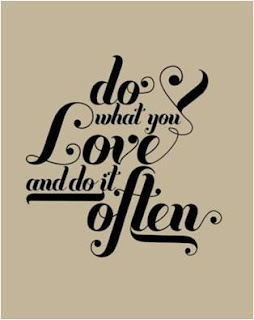In the end we will get something good out of so much crisis, so much unemployment and so much pessimism. Many people who are unemployed, or if they are unemployed, take advantage of their free time to carry out activities that fulfill them. Activities that, in times of good times, they did not have time to practice. Cooking, sewing, reading, collecting, playing sports are hobbies that, at the very least, make us forget, for a moment, about reality. We are talking about hobbies, passions.
Passion is something that we always have time for, we enjoy it and we feel fulfilled by achieving goals. In some cases we even challenge ourselves to meet goals (run a certain number of kilometers, cook increasingly laborious dishes, reach a certain number of visits to our blog, etc.). Some passions are inherited from our relatives, they may emerge naturally or they are simply the result of trends that cause us concern.
This passion normally appears as a hobby, a pastime that makes us feel good, it evolves into a passion when we spend most of our free time practicing it until it becomes a lifestyle giving rise to the famous phrase “Do “what you love and do it often.” That moment when we have achieved a goal makes us feel fulfilled and proud of ourselves, making it worth the effort (for example, getting to play that song on the guitar). The height of passion, which we would like to reach, is to dedicate ourselves professionally to it, earn money from it and enjoy working (I want to be a footballer, F1 driver, singer-songwriter...).
For the company, an important variable to take into account is the passion of its customers. Once we have identified the passions of our target, we must understand their needs and concerns on the subject. According to a study by Hamilton in collaboration with Esade Creápolis, 76% of the population declare themselves a fan of some activity. The study had a list of 64 activities from which 22 segments were identified based on their hobbies and the data extracted was very interesting.
Brands find themselves with the opportunity to be part of these passions to generate empathy with the consumer and, as a consequence, generate brand image. Some examples that we can easily find: energy drinks that are present in any activity related to risky sports, beer brands that accompany young targets to concerts and music festivals, brands of beautycare products for men with a YouTube channel offering the summary of the soccer league day and why not mention that the Spanish soccer league is sponsored by a banking entity.
The brand becomes part of the consumer's innermost being, such as his passions, his goals and even his professional ambition, which will hardly disappoint the client. If the brand is able to accompany the consumer during their journey of passion, we will have created a very strong emotional bond.
The debate is on what activities are profitable for the brand since the ROI may not be as expected, however indirectly, this investment will be returned to the brand in image, in the values it transmits and these actions may not be perceived as marketing. for the consumer.


